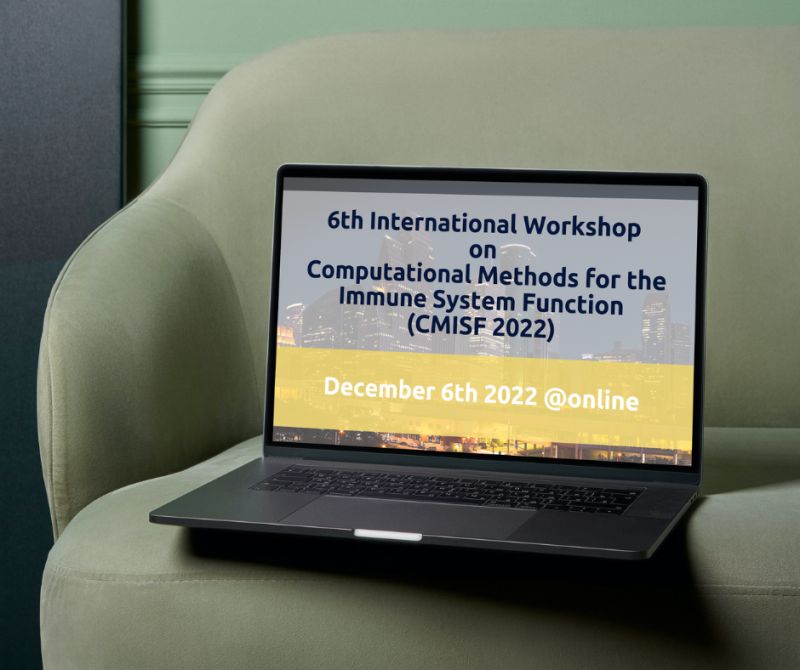𝟕𝐭𝐡 𝐈𝐧𝐭𝐞𝐫𝐧𝐚𝐭𝐢𝐨𝐧𝐚𝐥 𝐖𝐨𝐫𝐤𝐬𝐡𝐨𝐩 𝐨𝐧 𝐂𝐨𝐦𝐩𝐮𝐭𝐚𝐭𝐢𝐨𝐧𝐚𝐥 𝐌𝐞𝐭𝐡𝐨𝐝𝐬 𝐟𝐨𝐫 𝐭𝐡𝐞 𝐈𝐦𝐦𝐮𝐧𝐞 𝐒𝐲𝐬𝐭𝐞𝐦 𝐅𝐮𝐧𝐜𝐭𝐢𝐨𝐧 (𝐂𝐌𝐈𝐒𝐅 𝟐𝟎23)
6𝐭𝐡 𝐈𝐧𝐭𝐞𝐫𝐧𝐚𝐭𝐢𝐨𝐧𝐚𝐥 𝐖𝐨𝐫𝐤𝐬𝐡𝐨𝐩 𝐨𝐧 𝐂𝐨𝐦𝐩𝐮𝐭𝐚𝐭𝐢𝐨𝐧𝐚𝐥 𝐌𝐞𝐭𝐡𝐨𝐝𝐬 𝐟𝐨𝐫 𝐭𝐡𝐞 𝐈𝐦𝐦𝐮𝐧𝐞 𝐒𝐲𝐬𝐭𝐞𝐦 𝐅𝐮𝐧𝐜𝐭𝐢𝐨𝐧 (𝐂𝐌𝐈𝐒𝐅 2022)

We are thrilled to announce the sixth consecutive year of the Computational Methods in Systems and Functional Genomics (CMISF) workshop, held in conjunction with the #IEEE International Conference on #Bioinformatics and #Biomedicine.
🦠 This year’s theme: #ComputationalImmunology
Our workshop featured a range of perspectives on this vital topic from leading experts in the field.
🔸 Elena Crispino presented the groundbreaking article, “Cutaneous Leishmaniasis: Discovering New Effective Therapies Using the Universal Immune System Simulator.” Her work sheds new light on potential treatments for this debilitating disease.
🔸 Avisa Maleki delivered an insightful presentation on “Genetic Algorithm Application for the Prediction of Potential SARS-CoV-2 New Variant of Concern,” highlighting the use of advanced algorithms to anticipate and prepare for emerging variants of the virus.
👉 An Unmissable Opportunity
This workshop provides an invaluable platform for disseminating cutting-edge research and fostering the exchange of innovative ideas. We extend our heartfelt gratitude to all the researchers and participants who made this event a success. Your contributions are paving the way for new discoveries and advancements in bioinformatics and biomedicine.
Thank you for your dedication and passion! 🤗
5𝐭𝐡 𝐈𝐧𝐭𝐞𝐫𝐧𝐚𝐭𝐢𝐨𝐧𝐚𝐥 𝐖𝐨𝐫𝐤𝐬𝐡𝐨𝐩 𝐨𝐧 𝐂𝐨𝐦𝐩𝐮𝐭𝐚𝐭𝐢𝐨𝐧𝐚𝐥 𝐌𝐞𝐭𝐡𝐨𝐝𝐬 𝐟𝐨𝐫 𝐭𝐡𝐞 𝐈𝐦𝐦𝐮𝐧𝐞 𝐒𝐲𝐬𝐭𝐞𝐦 𝐅𝐮𝐧𝐜𝐭𝐢𝐨𝐧 (𝐂𝐌𝐈𝐒𝐅 2021)
The constant and rapid increasing of computing power has favored the diffusion of computational methods into immunology, giving the birth to computational immunology. Computational immunology, known also as immunological bioinformatics or immunoinformatics, is a modern research area that embraces data-driven computational and mathematical approaches able to model and describe the dynamics of cellular and molecular entities of the immune system, its disorders, and infections. Nowadays, immunoinformatics is dedicated to methods and tool developments for the analyses of omic-type data in immunology and knowledge inference using simulation, statistical inference, and machine learning algorithms. These fields are complementary key drivers of data-driven basic and translational immunology research for the benefit of human and animal health.

Furthermore, the simulation of the immune system for the design testing of new medical interventions in virtual patients through the set-up of in Silico Trials (IST) is a hot topic that will have a key role in the years to come. The Workshop will focus on the application of computer methods and computational models, at any level of description (e.g., microscopic/intracellular, mesoscopic/intercellular, macroscopic/tissue or organs), for the modeling of the immune system function, along with their application in understanding the pathogenesis of specific diseases (e.g., infectious diseases, cancers, hypersensitivities, autoimmune disorders). Topics of interest include, but are not limited to:
Modeling techniques, tools and approaches (e.g., agent based modeling, equation based modeling, network studies);
Computational models for cancer immunotherapy, autoimmune diseases, allergies and infectious diseases;
Spatially-extended models (e.g., models of lymph channels and/or lymph nodes);
Methods for in silico testing and optimization of therapeutic/vaccination schedules;
Multi-scale models and methods for encompassing two or more spatial and/or temporal scales (e.g., from cell functions to organs);
Novel methods and approaches for in Silico Trials;
Epidemiological models.
4𝐭𝐡 𝐈𝐧𝐭𝐞𝐫𝐧𝐚𝐭𝐢𝐨𝐧𝐚𝐥 𝐖𝐨𝐫𝐤𝐬𝐡𝐨𝐩 𝐨𝐧 𝐂𝐨𝐦𝐩𝐮𝐭𝐚𝐭𝐢𝐨𝐧𝐚𝐥 𝐌𝐞𝐭𝐡𝐨𝐝𝐬 𝐟𝐨𝐫 𝐭𝐡𝐞 𝐈𝐦𝐦𝐮𝐧𝐞 𝐒𝐲𝐬𝐭𝐞𝐦 𝐅𝐮𝐧𝐜𝐭𝐢𝐨𝐧 (𝐂𝐌𝐈𝐒𝐅 2020)
The constant and rapid increasing of computing power has favored the diffusion of computational methods into immunology, giving the birth to computational immunology. Computational immunology, known also as immunological bioinformatics or immunoinformatics, is a modern research area that embraces data-driven computational and mathematical approaches able to model and describe the dynamics of cellular and molecular entities of the immune system, its disorders, and infections. Nowadays, immunoinformatics is dedicated to methods and tool developments for the analyses of omic-type data in immunology and knowledge inference using simulation, statistical inference, and machine learning algorithms. These fields are complementary key drivers of data-driven basic and translational immunology research for the benefit of human and animal health.
Furthermore, the simulation of the immune system for the design testing of new medical interventions in virtual patients through the set-up of in Silico Trials (IST) is a hot topic that will have a key role in the years to come.
The Workshop will focus on the application of computer methods and computational models, at any level of description (e.g., microscopic/intracellular, mesoscopic/intercellular, macroscopic/tissue or organs), for the modeling of the immune system function, along with their application in understanding the pathogenesis of specific diseases (e.g., infectious diseases, cancers, hypersensitivities, autoimmune disorders).

